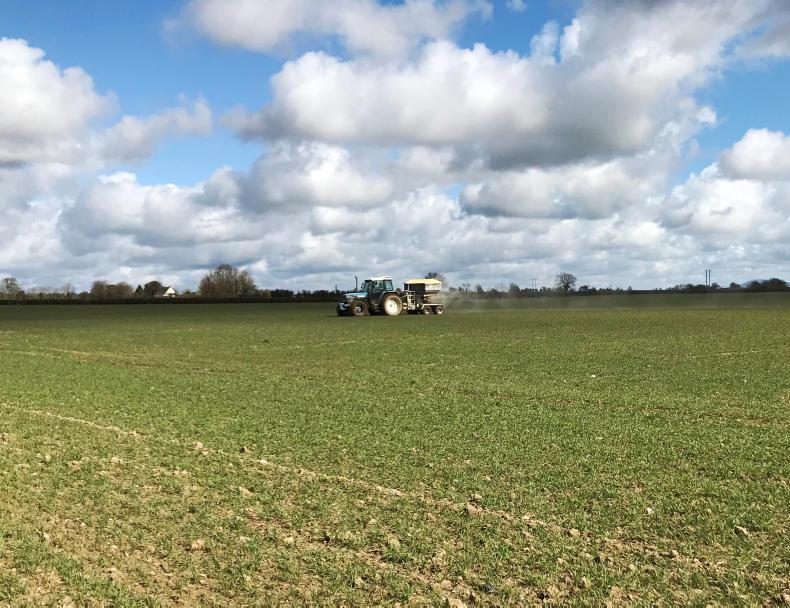
Busherstown, Co Carlow
Larry is happy with how his crops have come through the winter, despite the poor weather. His winter cereals were all sown around three weeks later than normal, right up until the end of October, and are now approaching GS30. This could yet be an advantage in terms of BYDV and weed control explains Larry.
Due to the late spring and poor weather over the previous number of weeks, ground conditions in Carlow remain difficult. This has delayed virtually all of the spring field work.
Last autumn, his winter barley and wheat received the aphicide Sparviero (50ml/ha) and either Firebird (0.3l/ha), Vigon (0.5l/ha), Stomp Aqua (2.9l/ha) or Diflanil (0.15l/ha) depending on the weeds present. The priority was to target annual meadow grass but a clean-up spray will still be required this spring.
So far, winter barley and oats have received 500kg/ha of 10.8.21+Mn. Winter barley received a further 94kg/ha of 27% N+5% S. Work has just started this week on applying 60kg N/ha (Super Net) on his winter wheat.
No spring ploughing has been done yet which is unusual for this time of year, Larry admits. Most of the stubble ground received an application of glyphosate (360g) at 4l/ha and is ready for ploughing once the ground dries up.
“We haven’t decided to abandon sowing beans just yet. We’ll just sow them a bit shallower now than we would have a month ago,” explains Larry. The aim is to use a contractor to direct drill beans at 240kg/ha at depths of 5cm. If the beans aren’t in the ground by 5 or 6 April, then he will reconsider.
Fertiliser (0.10.20) is broadcast on the seedbed before sowing, based on soil test results using a variable rate spreader. This may be topped up with straight K where needed. Most of the farm is soil-sampled down to 1ha grids which generates variable rate maps. Larry feels that the fertiliser is being placed more appropriately but sees the largest cost-saving coming from variable rate lime application.
“The T1 on barley and oats is all running later than last year so there’s going to be a shorter interval between that and the T2. There might be scope for savings in terms of rates.”

Clonmel, Co Tipperary
Spring hasn’t arrived in Tipperary yet as land remains wet and field work is well behind schedule. However, John is happy with the condition of his winter crops. All of the winter cereals were sown in early autumn and are now coming close to GS30. The wheat and barley received an application of Flight (3.5l/ha) last autumn, as well as Karis aphicide (0.5l/ha) but some crops will require an application of Axial (0.25l/ha) for wild oats, Cameo Max for volunteer beans (60g/ha) or Binder (0.75l/ha) for cleavers this spring.
The main job at the moment is spreading fertiliser and some progress has been made over the past week. John’s Belfry and Bazooka hybrid winter barley received 370kg/ha of 14.7.14 in February and will be topped up with 310-370kg/ha of Sulpha CAN (26.6% N+5% S) plus 125kg/ha of Muriate of Potash this week. The plan is to spread 370kg/ha of 14.7.14 on the oats and wheat as they are in definite need of nutrients at this stage, explains John.
Barley is coming close to T1 and PGR timings and John’s first spray will consist of Optimus (0.2l/ha), CCC (1l/ha) and Coyote (0.7l/ha) but disease pressure is low at the moment. Amazinc trace elements (1.0l/ha) will be included in this tank mix and John is also considering analysing leaf samples for trace element deficiencies.
All of the spring ploughing has yet to be started but he has spread some ground limestone (5t/ha) on spring bean ground aiming to raise the pH from 6.5 to 7.
John is a bit concerned about the lateness of the season for beans but he will stick to the plan until the first week of April. “If the seed wasn’t in the shed, it would be an easier decision to make.”
John uses a contractor with a Claydon direct drill and it works well, he says. Before drilling beans, he will broadcast 250kg/ha of 0.9.18+S, plus 125kg/ha of Muriate of Potash on the seedbed.
“If the weather comes right from now on I’d be optimistic, I have nice plant stands and three or four days could change the whole picture.”

Cloon, Co Donegal
Having escaped the snow, and with below average rainfall, Jamie has made good progress with field work so far this spring. Winter crops including wheat, barley and oilseed rape (WOSR) have come through the winter well despite having been sown late in challenging conditions.
Ground conditions are trafficable without causing damage, but it has been cold and frosty over the past number of weeks so there is little growth. None of the winter crops have received an autumn herbicide application as weather and ground conditions were poor when the crops were sown at the end of October. However, the slow spring has meant crops are generally clean. Jamie is aiming to apply a spring herbicide combination of Pendimethalin (600g/ha), Chlorotoluron (500g/ha) and DFF (80g/ha) in the coming weeks.
All of the winter fertiliser application is up to date. Winter wheat and barley received between 300kg and 450kg/ha of 0.10.20 based on soil tests and 70kg/ha to 80kg/ha of urea+S so far. Despite the slow growth, they have responded well to it.
The most advanced winter cereals are close to stem extension and Jamie plans to apply chlormequat (1l/ha), Moddus (0.1l/ha) and Manganese (2.5l/ha) once the temperature picks up.
WOSR has received 340kg/ha of 4.8.20+S plus 100kg/ha of urea+S when the GAI was around 0.8 in early March. This is now looking well. However, some of the WOSR was grazed by pigeons and around 8ha will have to be reseeded due to poor establishment and slug damage. Good progress has been made with spring field work. Jamie is around 50% through with ploughing. While it’s still early for spring barley, he plans to sow spring oats as soon as the weather permits.
Jamie is ready to plant early main crop Rooster potatoes but must wait for temperatures to increase first. The chitted tubers are planted using a converted automatic 32B planter capable of covering three hectares per day.
“Things are reasonably quiet in the fields as there’s not that much growth at the minute. I’m not overly concerned about planting date yet as I don’t want to put anything into the ground that won’t do anything.’’






 This is a subscriber-only article
This is a subscriber-only article














SHARING OPTIONS: